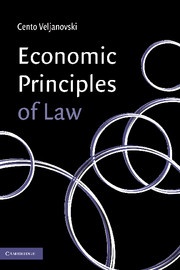4 - Contract
Published online by Cambridge University Press: 03 December 2009
Summary
The duty to keep a contract at common law means a prediction that you must pay damages if you do not keep it, and nothing else.
Oliver Wendell Holmes, 1897Contract is a subject where the relevance of economics is immediate and obvious. Firms and individuals draw up contracts in order to produce, distribute and sell goods and services. Contracts and contract law facilitate exchange and production, and freedom of contract is a necessary part of a market economy. It is therefore no surprise to learn that legal concepts of contract law have their roots in economics and commercial practice. As Atiyah observes, the classical legal model of contract ‘is without doubt, based on an economic model, that of the free market’. It would seem that, this being the case, the economist can contribute much to the analysis and understanding of contracts and contract law.
THE LAW
The central questions in contract law are clear: When is a promise enforceable? What remedy should be given, if any, for breaking a contract? These questions would seem easy to answer, and suggest a few straightforward rules – enforce genuine promises, enforce the terms agreed by the parties and provide remedies that the parties would have agreed had they addressed the contractual problems which have arisen subject to public policy considerations.
The reality is more complex and the law less certain. Key aspects of contract law are confused, unsettled and puzzling.
- Type
- Chapter
- Information
- Economic Principles of Law , pp. 109 - 180Publisher: Cambridge University PressPrint publication year: 2007
- 1
- Cited by



